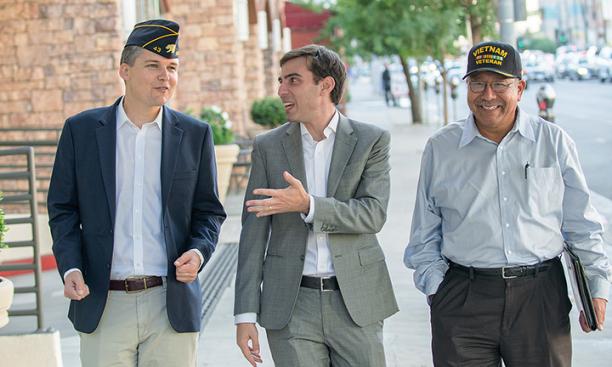
Jesse Max Creed ’07 is an attorney in Los Angeles who has fought for homeless veterans in the area.
The COVID-19 pandemic has been a social and economic challenge for every citizen of the United States. But for homeless veterans, it appears to have brought opportunity and action. Since the COVID-19 outbreak, the federal, state, and local governments have moved swiftly to open up long-overdue shelters and safe spaces for social distancing. How can homeless veterans comply with “safer-at-home” orders without a home?
I have been a lawyer and advocate for homeless veterans in Los Angeles, which has about 3,850 homeless vets. With other lawyers, I represented a class of homeless veterans in a suit against the Veterans Administration to restore 388 acres in the heart of Los Angeles to its historic purpose as a “Soldiers’ Home.” The VA agreed to support construction of 1,200 permanent homes for homeless veterans. I now work with the developers to build those homes.
With COVID-19, there is no choice but to safely and swiftly shelter all the homeless, including homeless veterans. The status quo of street-living not only conflicts with the safer-at-home orders, but also would present a public-health disaster. Homeless veterans lack easy access to running water for hand washing. Many live in crowded encampments separated by hole-ridden polyester tents, posing challenges to social-distancing directives.
Like all Americans, homeless veterans are scared. Advocates pressed the VA and local governments to expedite housing solutions at the Soldiers’ Home to protect the veterans’ health and safety. On April 2, two weeks after California Gov. Gavin Newsom issued his stay-at-home order, the VA opened a “Bridge Home” shelter in partnership with the city and county of Los Angeles, set up 138 beds for veterans who need to isolate or quarantine, and even created the first “tent city” in decades in Los Angeles. Any veteran may “safe camp” in tents on the 388-acre campus, which is predominantly open space. The camping program offers showers, restrooms, and hot meals. These new options complement the “safe parking” program I spearheaded, which allows homeless veterans living in their cars to park overnight on the campus, with access to a bathroom, meals, and water.
COVID-19 does not differentiate between the housed and the unhoused. This crisis is unique in that it has required the government to act to protect every individual, regardless of their political or economic powerlessness, because protecting each individual is necessary to protect the whole community. For the first time in my lifetime, there is a policy imperative to ensure the safety of a powerless minority — the homeless — to protect everyone alike.
PAW reached out to alumni who are on the front lines of the COVID-19 crisis or are affected by it in different ways. Read their essays here. Write to us at paw@princeton.edu with your own story.
